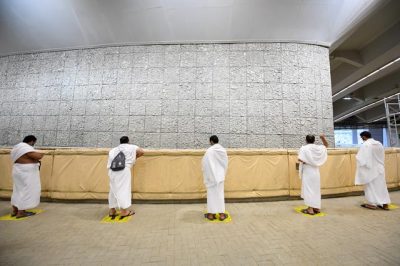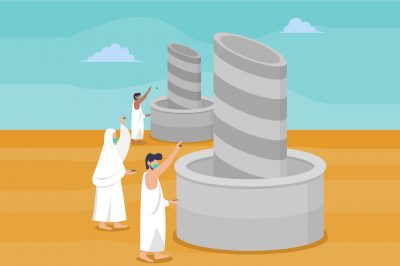Answer
Wa `alaykum as-Salamu wa Rahmatullahi wa Barakatuh.
In the Name of Allah, Most Gracious, Most Merciful.
All praise and thanks are due to Allah, and peace and blessings be upon His Messenger.
In this fatwa:
A pilgrim man choose one of the following options:
- A pilgrim may throw the jamarat (pebbles) in two days instead of three.
- A pilgrim may also depart from Mina on Dhul-Hijjah 13.
- A pilgrim may throw the pebbles any time during all the days of throwing, i.e., from morning until the dawn of the following day.
- Pilgrims may entrust some persons to throw the Jamarat on their behalf on condition that the person entrusted with this task throws the pebbles for himself first.
- A pilgrim may delay throwing all the pebbles until the last day of stoning the Jamarat.
Regarding your question, the following are options that pilgrims have concerning this issue:
Options for Throwing of the Pebbles
1- A pilgrim may throw the jamarat (pebbles) in two days instead of three. There is no scholarly disagreement over this point. In this case a pilgrim may leave Mina on Dhul-Hijjah 12 after throwing the pebbles on that day. According to the majority of scholars, a pilgrim here is to leave Mina before the sunset of that day. However, Imam Abu Hanifah holds the view that a pilgrim may stay until before the dawn time of the thirteenth day, for a new day begins after dawn time.
2- A pilgrim may also depart from Mina on Dhul-Hijjah 13. In fact, scholars favored this opinion over the first one. The Prophet left Mina on Dhul-Hijjah 13.
Allah Almighty says,
{Then whoso hastens [his departure] by two days, it is no sin for him, and whoso delays, it is no sin for him; that is for him who wards off (evil). Be careful of your duty to Allah, and know that unto Him you will be gathered.} (Al-Baqarah 2:203)
3- A pilgrim may throw the pebbles any time during all the days of throwing, i.e., from morning until the dawn of the following day. This wide range of time is meant to enable pilgrims to perform this ritual at ease; particularly, if there is a valid excuse like heavy rains.
Ata, the eminent jurist of Makkah in his time Tawus, the eminent jurist of Yemen in his time adopted this viewpoint. Both scholars received knowledge at the hands of Ibn `Abbas (may Allah be pleased with him).
That was also the opinion of Imam Abu Jafar Al-Baqir and some scholars from among Shafi`ite, Malikite and Hanbalite schools. This view was also reported to have been held by Imam Ahmad.
4- Pilgrims may entrust some persons to throw the Jamarat on their behalf on condition that the person entrusted with this task throws the pebbles for himself first. This applies also to the cases of pilgrims who, for valid reasons such as illness, old age, pregnancy, etc., cannot throw the Jamarat pebbles themselves.
5- A pilgrim may delay throwing all the pebbles until the last day of stoning the Jamarat. This is the opinion of the Hanbalite and Shafi`ite scholars. According to them, a pilgrim may throw all the pebbles, including those to be thrown on the Eid Day, on Dhul-Hijjah 13, for the days of Mina are regarded as one extended time.
With respect to spending the nights of these days at Mina, the majority of scholars regards it to be wajib (obligatory) and giving it up requires one to slaughter an animal as an expiation. But the Hanifite scholars and Ibn Hazm believe that it is only sunnah (recommendable).
Regarding the same point, some scholars are of the opinion that pilgrims who have valid reasons, like illness or fearing for their safety or money, may be exempted from spending these nights at Mina. This case applies also to the pilgrims in a situation like the one referred to in the question.
Allah the Almighty knows best.
Editor’s note: This fatwa is from Ask the Scholar’s archive and was originally published at an earlier date.


